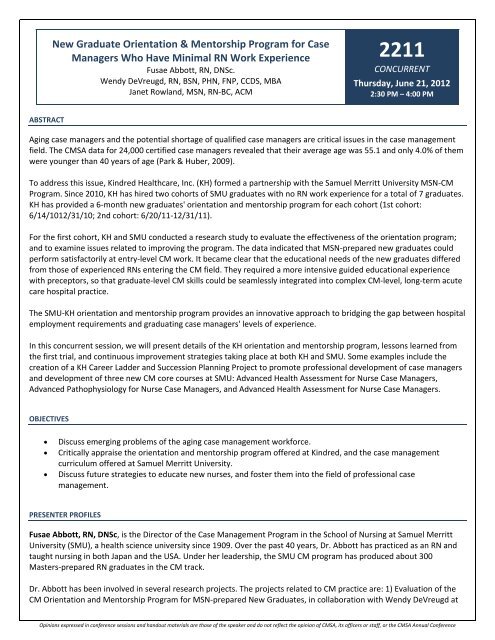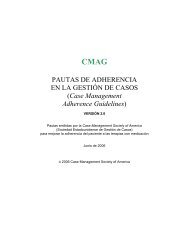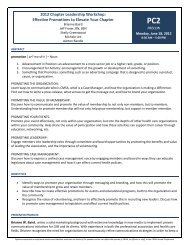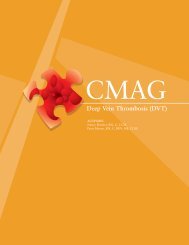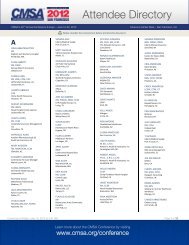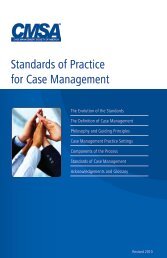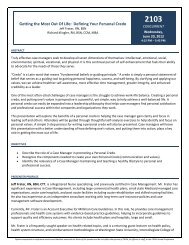New Graduate Orientation & Mentorship Program for Case ...
New Graduate Orientation & Mentorship Program for Case ...
New Graduate Orientation & Mentorship Program for Case ...
You also want an ePaper? Increase the reach of your titles
YUMPU automatically turns print PDFs into web optimized ePapers that Google loves.
ABSTRACT<br />
<strong>New</strong> <strong>Graduate</strong> <strong>Orientation</strong> & <strong>Mentorship</strong> <strong>Program</strong> <strong>for</strong> <strong>Case</strong><br />
Managers Who Have Minimal RN Work Experience<br />
Fusae Abbott, RN, DNSc.<br />
Wendy DeVreugd, RN, BSN, PHN, FNP, CCDS, MBA<br />
Janet Rowland, MSN, RN-BC, ACM<br />
2211<br />
CONCURRENT<br />
Thursday, June 21, 2012<br />
2:30 PM – 4:00 PM<br />
Aging case managers and the potential shortage of qualified case managers are critical issues in the case management<br />
field. The CMSA data <strong>for</strong> 24,000 certified case managers revealed that their average age was 55.1 and only 4.0% of them<br />
were younger than 40 years of age (Park & Huber, 2009).<br />
To address this issue, Kindred Healthcare, Inc. (KH) <strong>for</strong>med a partnership with the Samuel Merritt University MSN-CM<br />
<strong>Program</strong>. Since 2010, KH has hired two cohorts of SMU graduates with no RN work experience <strong>for</strong> a total of 7 graduates.<br />
KH has provided a 6-month new graduates' orientation and mentorship program <strong>for</strong> each cohort (1st cohort:<br />
6/14/1012/31/10; 2nd cohort: 6/20/11-12/31/11).<br />
For the first cohort, KH and SMU conducted a research study to evaluate the effectiveness of the orientation program;<br />
and to examine issues related to improving the program. The data indicated that MSN-prepared new graduates could<br />
per<strong>for</strong>m satisfactorily at entry-level CM work. It became clear that the educational needs of the new graduates differed<br />
from those of experienced RNs entering the CM field. They required a more intensive guided educational experience<br />
with preceptors, so that graduate-level CM skills could be seamlessly integrated into complex CM-level, long-term acute<br />
care hospital practice.<br />
The SMU-KH orientation and mentorship program provides an innovative approach to bridging the gap between hospital<br />
employment requirements and graduating case managers' levels of experience.<br />
In this concurrent session, we will present details of the KH orientation and mentorship program, lessons learned from<br />
the first trial, and continuous improvement strategies taking place at both KH and SMU. Some examples include the<br />
creation of a KH Career Ladder and Succession Planning Project to promote professional development of case managers<br />
and development of three new CM core courses at SMU: Advanced Health Assessment <strong>for</strong> Nurse <strong>Case</strong> Managers,<br />
Advanced Pathophysiology <strong>for</strong> Nurse <strong>Case</strong> Managers, and Advanced Health Assessment <strong>for</strong> Nurse <strong>Case</strong> Managers.<br />
OBJECTIVES<br />
� Discuss emerging problems of the aging case management work<strong>for</strong>ce.<br />
� Critically appraise the orientation and mentorship program offered at Kindred, and the case management<br />
curriculum offered at Samuel Merritt University.<br />
� Discuss future strategies to educate new nurses, and foster them into the field of professional case<br />
management.<br />
PRESENTER PROFILES<br />
Fusae Abbott, RN, DNSc, is the Director of the <strong>Case</strong> Management <strong>Program</strong> in the School of Nursing at Samuel Merritt<br />
University (SMU), a health science university since 1909. Over the past 40 years, Dr. Abbott has practiced as an RN and<br />
taught nursing in both Japan and the USA. Under her leadership, the SMU CM program has produced about 300<br />
Masters-prepared RN graduates in the CM track.<br />
Dr. Abbott has been involved in several research projects. The projects related to CM practice are: 1) Evaluation of the<br />
CM <strong>Orientation</strong> and <strong>Mentorship</strong> <strong>Program</strong> <strong>for</strong> MSN-prepared <strong>New</strong> <strong>Graduate</strong>s, in collaboration with Wendy DeVreugd at<br />
Opinions expressed in conference sessions and handout materials are those of the speaker and do not reflect the opinion of CMSA, its officers or staff, or the CMSA Annual Conference
Kindred Healthcare, Inc.; 2) Improving Transition from Hospital to Home, which was a pilot evaluation of the one-year<br />
implementation of the Sutter Transitions of Care program in collaboration with Jan Van der Mei at Sutter Health<br />
Sacramento Sierra Region; 3) Clinical and Financial Impact of the Pharmacy Therapeutic Benefit Change (PTBC),<br />
implemented in 2008, which was a clinical and financial analysis of the PTBC at SutterSelect Health Plan; and 4)<br />
Effectiveness of Chronic Disease Self-Management <strong>Program</strong> in Japan: Preliminary report of a longitudinal study, in<br />
collaboration with colleagues at Tokyo University in Japan (Nursing and Health Sciences,12, 456-463.)<br />
Disclosure: NONE.<br />
Wendy DeVreugd, RN, BSN, PHN, FNP, CCDS, MBA, is the Senior Director of <strong>Case</strong> Management <strong>for</strong> Kindred Healthcare<br />
Hospital Division's West Region (six states and 26 hospitals) <strong>for</strong> case management, social work, and clinical<br />
documentation improvement programs. Ms. DeVreugd has 41 years' clinical and advanced nursing practice, short-term<br />
and long-term acute care hospital management and strategic planning programs, quality management, risk<br />
management, infection control, acute and ambulatory care level case management, managed care development, shared<br />
risk contract management, disease state management programs, business management, clinical documentation<br />
improvement program inplementation, and legal nurse consulting.<br />
Professional affiliations: Ms. DeVreugd is an Editorial Advisor <strong>for</strong> HCPRO's <strong>Case</strong> Management Monthly: Best Practices<br />
and Practical Solutions, and a regular contributing columnist <strong>for</strong> CMSA Today ("<strong>Mentorship</strong> Matters"). She is a past<br />
Advisory Board member of the Association <strong>for</strong> Clinical Documentation Improvement (2007-2010), and is a member of<br />
several ACDIS workgroups. Ms. DeVreugd actively works with CMSA through Kindred Healthcare's Silver Company<br />
Partnership to support new case manager career development, and will participate in the CMSA Career and Knowledge<br />
Pathways project in 2012. Ms. DeVreugd has developed several University Educational Partnerships to benefit the<br />
ongoing growth and development of Kindred's case managers, and developed and implemented a MSN in <strong>Case</strong><br />
Management <strong>Mentorship</strong> <strong>Program</strong> in partnership with Samuel Merritt University in Oakland, CA, <strong>for</strong> graduate-level<br />
degree nurses with a specialty in case management, which is in its third year of supporting new nurses into the field of<br />
case management <strong>for</strong> career development.<br />
Disclosure: Speaker discloses that she is on the HCPRO Editorial Advisory Board <strong>for</strong> <strong>Case</strong> Management Monthly: Best<br />
Practices and Practical Solutions (periodical).<br />
Janet Rowland received her RN and AA degree from Contra Costa College; BSN from the University of the State of NY;<br />
MSN from Samuel Merritt College in Nursing <strong>Case</strong> Management; and is currently a doctoral candidate at St Mary's<br />
College of CA. She is certified by the ANCC as a Nurse <strong>Case</strong> Manager, and is a member of the ANCC Content Expert Panel<br />
in <strong>Case</strong> Management. She has over 15 years' experience in case management; and is currently an Assistant Professor at<br />
Samuel Merritt College School of Nursing, in the MSN <strong>Case</strong> Management <strong>Program</strong>.<br />
Disclosure: Speaker discloses that she has involvement with the NAPGCM Journal Editorial Board, but is not<br />
compensated.<br />
Opinions expressed in conference sessions and handout materials are those of the speaker and do not reflect the opinion of CMSA, its officers or staff, or the CMSA Annual Conference
<strong>New</strong> <strong>Graduate</strong> <strong>Orientation</strong> and<br />
<strong>Mentorship</strong> <strong>Program</strong><br />
<strong>for</strong> <strong>Case</strong> Managers Who Have<br />
Minimal RN Work Experience<br />
Fusae Kondo Abbott, RN, DNSc.<br />
Wendy M. DeVreugd, RN, BSN, PHN,<br />
FNP, CCDS, MBA<br />
Janet W Rowland, MSN, RN‐BC, ACM<br />
Session Outline<br />
• Background<br />
– Challenges<br />
• Partnership between Kindred and SMU<br />
• MSN <strong>New</strong> <strong>Graduate</strong> <strong>Orientation</strong> and <strong>Mentorship</strong><br />
<strong>Program</strong><br />
– Educational preparation at SMU<br />
– <strong>Orientation</strong> and mentorship at Kindred<br />
• Results of the program<br />
• Lessons learned from the first cohort<br />
• Future plans<br />
Recruiting and Retaining<br />
<strong>Case</strong> Managers<br />
• Outside, aggressive<br />
talent acquisition<br />
ef<strong>for</strong>ts<br />
• High entry and exit<br />
rates among various<br />
healthcare settings<br />
• Existing company<br />
turnover and<br />
retention rates<br />
…AFFECTS…<br />
• Quality of case<br />
management services<br />
• High turnover costs of<br />
recruitment and<br />
training<br />
• Revenue capture<br />
• Patient and family<br />
satisfaction<br />
1<br />
3<br />
5<br />
Objectives<br />
1. Discuss emerging problems of the aging case<br />
management work<strong>for</strong>ce<br />
2. Critically appraise the orientation and<br />
mentorship program offered at Kindred and<br />
the CM curriculum offered at Samuel<br />
Merritt University<br />
3. Discuss future strategies to educate new<br />
nurses and foster them into the field of<br />
professional case management<br />
Challenges in the <strong>Case</strong> Management Field<br />
• Aging case managers<br />
• Potential shortage of qualified case managers<br />
– Average age of certified CMs: 55.1<br />
– Only 4.0% of 24,000 certified CMs: < 40<br />
50<br />
45<br />
40<br />
35<br />
30<br />
25<br />
20<br />
15<br />
10<br />
5<br />
0<br />
Age<br />
=60<br />
(Park & Huber, 2009)<br />
35<br />
30<br />
25<br />
20<br />
15<br />
10<br />
5<br />
0<br />
Years of Experience & Age<br />
2‐5 6‐10 11‐15 16=<<br />
50.2 53.0 55.9 59.0<br />
Kindred Challenges<br />
• 2008‐2009 nationwide case manager<br />
turnover rates up to 38%<br />
• 2010 Survey<br />
� 89% of West Region case managers over age 40<br />
� 65% over age 50<br />
� 22% over age 60<br />
60<br />
55<br />
50<br />
2<br />
4<br />
6<br />
1
We Need a<br />
<strong>Case</strong> Manager<br />
NOW<br />
We Want a Nurse Who Has:<br />
• Years of RN work experience<br />
• A good understanding about CM practice<br />
(complexity and system's approach)<br />
– Finance, regulations<br />
– DC, UM, CM in general<br />
• Mature (professional demeanor)<br />
• Passionate about case management<br />
• Willing to learn<br />
• Flexible in adapting to changes<br />
Educational Partnership Vision<br />
• Infuse and foster a larger access <strong>for</strong> the<br />
professional case management community<br />
through networking, publishing, and<br />
professional educational alliances to provide<br />
meaningful mentorship opportunities, while<br />
mutually benefiting graduate registered<br />
nurses<br />
7<br />
9<br />
11<br />
• Who is qualified!<br />
• Who can work from<br />
tomorrow!<br />
One Solution<br />
• Educational partnership between:<br />
–Samuel Merritt University<br />
–Kindred Healthcare, Inc.<br />
• Providing a 6‐month, new‐graduate<br />
orientation and mentorship<br />
program <strong>for</strong> new MSN graduates<br />
with no RN work experience<br />
Who is Kindred Healthcare?<br />
“Dedicated to Hope, Healing, and Recovery”<br />
• Leading Provider of Post Acute Care Services specializing in<br />
critically‐ill and complex patients<br />
• Publically traded healthcare organization with corporate<br />
headquarters in Louisville, Ky.<br />
• 121 Acute Care Hospitals throughout the U.S. in 40 states<br />
• Also has Skilled Nursing, Rehab‐based contracts, and Home<br />
Hospice divisions<br />
• Ranked one of Fortune magazine’s Most Admired Healthcare<br />
Companies 2009, 2010, and 2011<br />
8<br />
10<br />
12<br />
2
Market Specific Integrated and Coordinated Care<br />
Delivery Models<br />
LTACHs (121)<br />
Inpatient Rehab Hospitals (5)<br />
Nursing and Rehabilitation Centers (224)<br />
Acute Rehabilitation Units (113)<br />
RehabCare External Customers (1,563)<br />
Home Care and Hospice (19)<br />
Existing Cluster Market<br />
Potential <strong>New</strong> Cluster Market<br />
(as of June 1, 2011)<br />
With Focus On Developing Cluster Market Service Offerings<br />
Kindred Complex <strong>Case</strong> Management:<br />
Roles and Functions<br />
Complex skills promoted in:<br />
• Resource management<br />
• Complex discharge planning<br />
• Interdisciplinary care<br />
facilitation and coordination<br />
• Clinical Documentation<br />
Improvement (CDI)<br />
• Patient and family advocacy<br />
History<br />
1909–<br />
Diploma<br />
Nursing<br />
<strong>Program</strong><br />
Department of…<br />
1981–<br />
BSN in conjunction<br />
with St. Mary’s<br />
College<br />
1990-MPT<br />
•Kindred has 3 Regions:<br />
• West<br />
• Central<br />
• Southeast<br />
• Over 500 RN and SW case<br />
managers<br />
• Typical caseload:<br />
• 1:15 ‐1:18<br />
MSN programs:<br />
1993-FNP<br />
1994-CRNA<br />
1996-ELMSN<br />
1997-CM<br />
1994-MOT<br />
1999-MPA<br />
1999–<br />
A Sutter<br />
Affiliate<br />
2005–<br />
ABSN<br />
13<br />
15<br />
2011–<br />
DNP<br />
2002-DPT(1994)<br />
2002-DPM<br />
17<br />
Patient Service Intensity<br />
Uniquely Positioned to Take Advantage of<br />
Changing Healthcare Landscape<br />
HOME<br />
OUTPATIENT<br />
REHAB<br />
ADULT<br />
DAY CARE<br />
HOME<br />
HEALTH<br />
CARE<br />
“Continue The Care”<br />
ASSISTED<br />
LIVING<br />
TCC<br />
SKILLED &<br />
NURSING TCU<br />
FACILITIES<br />
Patient Illness Severity<br />
LTACs<br />
FREESTANDING/ HIH<br />
IN‐PATIENT SAU<br />
REHAB<br />
HOSPICE<br />
ACUTE CARE<br />
HOSPITALS<br />
TRANS<br />
CARE<br />
Samuel Merritt University:<br />
A Health Science University<br />
– In 1909, enrolled first class of 18 in<br />
a diploma nursing program<br />
– In 1981, transitioned to a BSN‐<br />
granting institution<br />
– Now offers 13 specialty health<br />
science programs<br />
– Prepares the most NCLEX‐eligible<br />
graduates in Cali<strong>for</strong>nia<br />
– about 500/year<br />
ELMSN‐CM Curriculum<br />
Semester 1 – Semester 4<br />
Pre‐Licensure Total: 61 units<br />
Semester 5<br />
Research Methods<br />
History and Theories of Nursing<br />
Analysis of Health Policy Issues<br />
Semester 6<br />
Epidemiology and Bio‐Statistics<br />
<strong>Program</strong> Evaluation and QI<br />
Healthcare Finance<br />
Semester 7<br />
Synthesis Requirement<br />
<strong>Case</strong> Management<br />
3 units<br />
3 units<br />
3 units<br />
3 units<br />
3 units<br />
3 units<br />
3 units<br />
8 units<br />
(3 units theory + 5 units clinical)<br />
Total 90 units<br />
ICU<br />
14<br />
16<br />
18<br />
3
<strong>Case</strong> Management Theory: Topics<br />
•<strong>Case</strong> management models<br />
•Acute hospital case management<br />
• Discharge planning / Utilization management<br />
• MS‐DRGs, LOS, Medicare regulations, compliance, cost<br />
benefit analysis, etc.<br />
•Disease management/health education<br />
•Cultural dimensions of health care<br />
•Outcomes evaluation<br />
•Legal and ethical issues in CM practice<br />
•Future directions <strong>for</strong> case management<br />
<strong>Case</strong> Management Clinical<br />
• Preceptorship<br />
• 225 hours at various settings, including clinical<br />
seminar –1 hr/week at school<br />
• Learning activities<br />
• A plan of clinical practicum<br />
• Clinical logs<br />
• <strong>Case</strong> study & life care plan<br />
• Seminar attendance & participation<br />
•CM certifications / CM professional organizations 19<br />
20<br />
• Community hospitals<br />
• Sutter<br />
• John Muir<br />
• Marin General<br />
• Dignity Health<br />
• Kaiser –17 facilities<br />
• University hospitals<br />
• UCSF<br />
• Stan<strong>for</strong>d<br />
• VA<br />
Clinical Sites<br />
•County hospitals<br />
•Alameda County Public<br />
Health<br />
•Sutter VNA & Hospice<br />
•Community‐based<br />
programs<br />
•Westside Community<br />
Mental Health Center<br />
•Brighter Beginnings<br />
•RNS Healthcare<br />
Synthesis Projects<br />
1 Disease Management of Community‐dwelling Patients with Heart Failure<br />
2 <strong>Case</strong> Management Approach to Reduce Global Burden of Neglected Tropical Disease<br />
3 <strong>Case</strong> Management in the NICU: Improving Safe Discharge<br />
4 Telephonic <strong>Case</strong> Management <strong>for</strong> End Stage Congestive Heart Failure<br />
5 <strong>Case</strong> Management of Obesity in Adults<br />
6 Osteoarthritis in the Older Population: A <strong>Program</strong> to Improve Outcomes<br />
7 <strong>Case</strong> Management <strong>Program</strong> <strong>for</strong> Mothers with Gestational Diabetes Mellitus<br />
8 Transition to Rehabilitation: A <strong>Case</strong> Management Process <strong>for</strong> Traumatic Spinal Cord<br />
Injury<br />
9 A <strong>Case</strong> Management <strong>Program</strong> <strong>for</strong> the Reduction in Rates of Heart Disease in Women<br />
Veterans with a History of MST and/or Diagnosis of PTSD<br />
10 PEMS‐MED: Preventing Elderly Male Suicide by Managing Elderly Depression<br />
11 A <strong>Case</strong> Management <strong>Program</strong> <strong>for</strong> Pregnant and Parenting Teens<br />
12 A <strong>Case</strong> Management Proposal <strong>for</strong> Women with Ovarian Cancer to Improve Outcomes<br />
13 A <strong>Case</strong> Management <strong>Program</strong> of Medication Management <strong>for</strong> Community‐dwelling<br />
Filipinos<br />
Synthesis Projects<br />
• Development of a case management program<br />
• Development of an interdisciplinary CM tool<br />
• Development of a research proposal in<br />
relation to CM practice<br />
• Development of a cost-effective and efficient<br />
CM process within an acute care setting and<br />
in the transition from acute care to the next<br />
level of care<br />
Consultants 21<br />
22<br />
23<br />
Kindred’s Goals<br />
<strong>for</strong> <strong>Case</strong> Management<br />
•Differentiation of company ‐ LTAC<br />
•Branding <strong>for</strong> excellent case/care management<br />
•Social responsibility<br />
•Give back to community and CM field<br />
•Grow competencies in case management<br />
•Reduce case manager turnover to < 10%<br />
annually, increase retention > 1 year to > 85%<br />
Excellent Patient Care Management<br />
24<br />
4
Kindred/Samuel Merritt Partnership:<br />
2010 MSN in <strong>Case</strong> Management<br />
<strong>Mentorship</strong> <strong>Program</strong><br />
March<br />
June<br />
July-<br />
Dec<br />
• Kindred hired 3 MSNs<br />
• Intensive “onboarding”<br />
4-week orientation<br />
• 5-month mentorship at<br />
hired local sites<br />
<strong>Mentorship</strong> <strong>Program</strong> Approval<br />
1. Identification of need:<br />
• <strong>Case</strong> manager shortage<br />
• Existing turnover rates<br />
• Aging case manager work<strong>for</strong>ce<br />
• Need <strong>for</strong> higher CM competencies <strong>for</strong> complex<br />
patient care management<br />
2. Relating advantages of educational<br />
partnership<br />
3. Pro<strong>for</strong>ma: Projected costs vs. Return<br />
on investment<br />
25<br />
27<br />
Kindred/Samuel Merritt Partnership:<br />
2010 MSN in <strong>Case</strong> Management<br />
<strong>Mentorship</strong> <strong>Program</strong><br />
March<br />
June<br />
July-<br />
Dec<br />
• Kindred hired 3 MSNs<br />
• Intensive “onboarding”<br />
4-week orientation<br />
• 5-month mentorship at<br />
hired local sites<br />
Pre‐Hire<br />
•Notification to Samuel Merritt students<br />
•Develop selection process structure<br />
•Selection committee participants<br />
•Arrange job interviews with respondents<br />
•Predictive Index testing prior to interview<br />
•Through interviews, identify strong MSN<br />
commitment to change and growth<br />
•Match with Kindred mission, vision, values<br />
Good to Great –Jim Collins<br />
"Those who build great companies understand<br />
that the ultimate throttle on growth <strong>for</strong> any<br />
great company is not markets, or technology, or<br />
competition, or products. It is one thing above<br />
all others: the ability to get and keep<br />
enough of the right people. “<br />
What does Collins mean by the “right people’?<br />
29 30<br />
26<br />
28<br />
5
Predictive Index Helps Answer<br />
Questions Like:<br />
What motivates people to action?<br />
For what kinds of work are they best suited?<br />
What meets their needs, and there<strong>for</strong>e<br />
unleashes their energy and best ef<strong>for</strong>ts?<br />
How do they reach their judgments around<br />
people and things? What is their basis <strong>for</strong><br />
judgment?<br />
4-Week “Onboarding” - What Is It?<br />
Onboarding, also known as organizational socialization, refers to the mechanism through which new<br />
employees acquire the necessary knowledge, skills, and behaviors to become effective organizational<br />
members and insiders. Bauer, T. N., & Erdogan., B. (2011).<br />
Factor A -measures the<br />
drive to exert one’s<br />
influence on people and<br />
events.<br />
Predictive Index Testing<br />
Reference: The Oliver Group, www.olivergroup.com<br />
Per<strong>for</strong>mance = Competence X Motivation<br />
A<br />
LOW Relative to Norm<br />
NORM<br />
AVERAGE<br />
Relative to Norm HIGH<br />
Unassuming, Unselfish Dominant, Assertive<br />
D O M I N A N C E<br />
Factor B – measures the<br />
drive <strong>for</strong> social interaction<br />
Reserved, Introspective Extroverted, Sociable<br />
with other people.<br />
Factor C - measures the<br />
B EXTROVERSION<br />
intensity of a person’s<br />
tension and pace.<br />
Driving, Intense Patient, Relaxed<br />
Factor D - measures the<br />
drive to con<strong>for</strong>m to<br />
<strong>for</strong>mal rules and<br />
structure.<br />
C P A T I E N C E<br />
In<strong>for</strong>mal, Independent Formal, Con<strong>for</strong>ming<br />
D F O R M A L I T Y<br />
31 32<br />
33<br />
35<br />
35<br />
Kindred/Samuel Merritt Partnership:<br />
2010 MSN in <strong>Case</strong> Management<br />
<strong>Mentorship</strong> <strong>Program</strong><br />
March<br />
June<br />
July-<br />
Dec<br />
• Kindred hired 3 MSNs<br />
• Intensive “onboarding”<br />
4-week orientation<br />
• 5-month mentorship at<br />
hired local sites<br />
4‐Week Classroom Teaching<br />
•Patient Assessment<br />
•Discharge Planning<br />
•Utilization Management<br />
•Quality –PDCA Model<br />
•MS‐LTC DRGs<br />
•Clinical Documentation<br />
Improvement (CDI)<br />
•Coding Facesheets Review<br />
–Basic Concepts<br />
•Attend DCM Leadership<br />
Monthly Call<br />
•Clinical<br />
•Floor <strong>Orientation</strong><br />
•Respiratory Therapy<br />
•Wound Care<br />
•Infection Control<br />
•EMR Training<br />
•InterQual LTACH &<br />
Software Training<br />
•Allscripts Training<br />
•Practicum(s)<br />
34<br />
36<br />
6
Kindred/Samuel Merritt Partnership:<br />
2010 MSN in <strong>Case</strong> Management<br />
<strong>Mentorship</strong> <strong>Program</strong><br />
March<br />
June<br />
July-<br />
Dec<br />
• Kindred hired 3 MSNs<br />
• Intensive “onboarding”<br />
4-week orientation<br />
• 5-month mentorship at<br />
hired local sites<br />
Considering Cultural Diversity…<br />
•Individual Needs of Mentorees:<br />
CEO/Leadership Review <strong>for</strong> Support<br />
•Patients and Families: Worksite Cultural<br />
Diversity Review<br />
•Match Needs of Both Facility and MSN CM<br />
•Other Opportunities<br />
What Comes Next after <strong>Mentorship</strong>?<br />
• “<strong>Mentorship</strong> Should Never End”<br />
• Identify MSN’s goals <strong>for</strong> career development<br />
as a CM<br />
• “Career Ladder” choice <strong>for</strong> next phase at<br />
Kindred<br />
•Clinical expert: Certification<br />
•Administration<br />
•1, 3, 5 year plans<br />
37<br />
39<br />
<strong>Mentorship</strong> 5‐Month Structure<br />
2‐Week Break <strong>for</strong> Relocation to Hired Sites<br />
•Meeting facility CEO &<br />
preceptor to discuss<br />
individual support needs<br />
•Regular meetings with<br />
preceptors to monitor<br />
progress<br />
•CM competency progress<br />
documented<br />
•Follow‐up on assigned areas<br />
needing to be strengthened<br />
•Weekly MSN SWOTS<br />
<strong>for</strong> “reflective practice”<br />
and self‐identified<br />
growth opportunities<br />
•Weekly calls <strong>for</strong><br />
support and resources<br />
•Publishing of one<br />
complex patient case<br />
Kindred/Samuel Merritt Partnership:<br />
2010 MSN in <strong>Case</strong> Management<br />
<strong>Mentorship</strong> <strong>Program</strong><br />
March<br />
June<br />
July-<br />
Dec<br />
• Kindred hired 3 MSNs<br />
• Intensive “onboarding” 4week<br />
orientation<br />
• 5-month mentorship at hired<br />
local sites<br />
What’s Next?<br />
Beyond <strong>Orientation</strong> & <strong>Mentorship</strong><br />
Evaluation of the MSN-Prepared CM <strong>New</strong> <strong>Graduate</strong>s’ 2010 <strong>Orientation</strong> and <strong>Mentorship</strong> <strong>Program</strong><br />
Fusae Abbott, RN, DNSc., Wendy De Vreugd, RN, BSN, FNP, CCDS, MBA, Janet Rowland, RN, MSN<br />
Samuel Merritt University & Kindred Healthcare, Inc.<br />
Background<br />
Aging case managers and the potential<br />
shortage of qualified case managers are<br />
critical issues in the case management field.<br />
The CMSA data <strong>for</strong> 24,000 certified case<br />
managers (CCMs) revealed that the average<br />
age of the CCMs was 55.1 and only 4.0% of<br />
them were younger than 40 years of age<br />
(Park & Huber, 2009).<br />
Purpose<br />
The purpose of the study was to evaluate the<br />
effectiveness of the CM orientation and mentorship<br />
program <strong>for</strong> MSN-prepared new graduates with no RN<br />
work experience.<br />
Research Questions<br />
• Can an MSN-prepared new CM graduate from<br />
SMU, with no RN work experience, per<strong>for</strong>m<br />
competently as a case manager after completing a 6month<br />
new graduate orientation and mentorship<br />
program?<br />
• What parts of the orientation and mentorship<br />
program helped the graduate to function as a case<br />
manager? To what degree? What didn’t work?<br />
Methods<br />
• A case study method<br />
• Subjects: Three SMU new graduates and their four<br />
trainers.<br />
<strong>Case</strong> Management <strong>Program</strong><br />
Although the healthcare industry recognizes the<br />
shortage issue, SMU ELMSN-CM graduates still<br />
face difficulties in obtaining CM positions.<br />
Hospitals traditionally require 1 to 3 years of RN<br />
work experience <strong>for</strong> CM entry positions, but<br />
ELMSN-CM students can have no more than one<br />
year of RN work experience by the time they<br />
graduate.<br />
Findings<br />
“Subjects”<br />
Subjects SMU <strong>New</strong> KH Trainers<br />
Number<br />
<strong>Graduate</strong>s<br />
3 4<br />
Age 25 to 34 51 to 60<br />
Work experience 1 to 10 years N/A<br />
be<strong>for</strong>e SMU<br />
Work as an RN 0 more than 30 years<br />
Work as a CM 0 6 to 30 years<br />
Work as a manager 0 11 to 30 years<br />
“Can new CM graduates per<strong>for</strong>m<br />
competently as case managers after<br />
orientation/mentorship?”<br />
�All three SMU new graduates met all the standards<br />
<strong>for</strong> the 90-day evaluations, as assessed by their<br />
supervisors at KH.<br />
�At the end of the 6-month program the three<br />
graduates were rated on a 5-point scale as functioning<br />
at “independent” or higher levels <strong>for</strong> all the CM<br />
functions, as assessed by their trainers.<br />
In 2010, Kindred Healthcare, Inc. <strong>for</strong>med a<br />
partnership with the SMU CM <strong>Program</strong> and<br />
hired three SMU-CM graduates who had no<br />
RN work experience. KH Hospital Division,<br />
West Region provided a 6-month new<br />
graduates’ orientation and mentorship<br />
program (6/14/10 – 12/31/10).<br />
“What worked and what didn’t”<br />
�Factors related to the success of the program<br />
� Work environment<br />
� Support provided from senior administrators<br />
to staff CMs<br />
� Having some experienced CMs to whom the<br />
graduates could go <strong>for</strong> advice and suggestions<br />
� Stable staffing<br />
� Welcoming atmosphere<br />
�<strong>Graduate</strong>s’ characters and skills<br />
� Positive and “Can Do” attitudes<br />
� “Self-starters” and flexibility<br />
� People skills<br />
� Organizational skills<br />
� Time management<br />
� Ability to ask <strong>for</strong> help Conclusion<br />
Learning process:<br />
Challenges and what helped<br />
38<br />
40<br />
Recommendations<br />
To the SMU-CM program:<br />
1.Five-minute case presentation exercises in clinical<br />
seminars.<br />
2.Reviewing standard treatment options <strong>for</strong> five<br />
common disease conditions seen during a student’s<br />
preceptorship.<br />
3.Communication simulation exercises involving<br />
difficult patients, family members, and physicians.<br />
4.Speaking up in inter-disciplinary meetings during the<br />
clinical practicum.<br />
To KH:<br />
1.Strengthen the 4-week orientation to bring new<br />
graduates onboard to KH.<br />
2.Provide opportunities <strong>for</strong> new graduates to work at<br />
least a week with bedside RNs and priority LTAC<br />
ancillary services.<br />
3.Teach LTAC-specific equipment and treatments.<br />
4.Develop critical pathways <strong>for</strong> five common disease<br />
conditions at LTAC.<br />
5.Teach about site-specific issues, such as resources in<br />
the community, insurance companies and kinds of<br />
insurance that patients may carry, physician practice<br />
patterns, and types of patients.<br />
�The data indicated that MSN-prepared new graduates<br />
could per<strong>for</strong>m satisfactorily at entry-level CM work.<br />
�It became clear that the educational needs of the new<br />
graduates differed from experienced RNs entering the<br />
CM field.<br />
�It is necessary to define what RN work experience is<br />
critical to CM practice.<br />
�The challenge to MSN education is to find how<br />
academia can prepare graduates on those critical tasks,<br />
and so prepare the next generation of case managers.<br />
Implications<br />
CM Functions and Skills<br />
Time Frame Challenges What Helped Progress<br />
First 4 weeks<br />
‐ Fear, uncertainty, ‐ Talked about these ‐ By the end of the 3<br />
– Classroom teaching anxiety<br />
feelings with a trainer<br />
‐ Lack of clinical<br />
‐ Supportive environment<br />
�The SMU-Kindred orientation and mentorship program<br />
Discharge Assessment (identifying a patient’s clinical trajectory and anticipated<br />
experience<br />
‐ Learned about CM tools<br />
and applied them right<br />
process treatments, critical thinking)<br />
provides an innovative approach to bridging the gap<br />
after the lectures<br />
Planning (multi‐disciplinary collaboration)<br />
between hospital employment requirements and<br />
Implementation (coordination, education, referrals, resource linkage)<br />
Evaluation (documentation and reporting)<br />
graduating case managers’ levels of experience.<br />
Utilization Authorization, concurrent review, use of criteria, documentation <strong>for</strong><br />
�Based on the successful outcome of this trial in 2010,<br />
management compliance, appeal process, managing inappropriate utilization<br />
the partnership between SMU and KH continues and KH<br />
Communication Patients and their families, physicians, payers, staff, etc.<br />
Advocacy Collaboration, negotiation<br />
has hired four SMU graduates in 2011.<br />
In<strong>for</strong>mation Identifying best practice, quality improvement<br />
�KH has created a Career Ladder to promote<br />
search<br />
Per<strong>for</strong>mance Organization, problem‐solving, ability to ask questions and to ask <strong>for</strong><br />
professional development of case managers.<br />
skills<br />
help<br />
42<br />
Professionalism<br />
• Discuss the plan with the MSNs 41<br />
42<br />
rd Data Collected:<br />
week the new<br />
graduates felt confident in<br />
applying the CM tools, knowledge,<br />
and skills that they learned.<br />
• Demographics and characteristics of the<br />
subjects<br />
1 to 3 months<br />
‐ Communication with ‐ Learned about how to<br />
– By the end of 90 family members deal with difficult<br />
• Thoughts and feelings of the new graduates and<br />
days<br />
‐ Dealing with end‐of‐ patients’ cases<br />
life care issues<br />
their trainers in regard to the program<br />
3 to 4 months<br />
‐ Communication with ‐ Learned about how to ‐ Helping others, teaching others<br />
– <strong>Case</strong>loads increased physicians<br />
negotiate with<br />
‐ Felt com<strong>for</strong>table in dealing with<br />
• Confidence and competency levels of the<br />
‐ Building relationships physicians<br />
families – thanked by family<br />
with physicians<br />
‐ Learned to work on time members <strong>for</strong> listening to and<br />
graduates<br />
management and<br />
answering their concerns<br />
• Various on-going assessments at KH as part of<br />
prioritization<br />
4 to 6 months<br />
‐ Common challenges ‐ Learned to negotiate with ‐ Began negotiating with insurance<br />
their standard practice <strong>for</strong> new hires<br />
– Dealing with difficult faced by CMs at LTAC insurance companies and companies, SNFs, and physicians to<br />
cases<br />
‐ Recognized that they SNFs<br />
facilitate discharge decisions<br />
• Weekly SWOTT reports by the new graduates<br />
were staying late at ‐ Needed to find the ‐ Each published an article about<br />
work<br />
balance between work dealing with a difficult case<br />
and their personal lives<br />
7
Research Study on the First Cohort<br />
Research Questions<br />
• Can an MSN‐prepared new CM graduate from<br />
SMU, with no RN work experience, per<strong>for</strong>m<br />
competently as a case manager after<br />
completing a 6‐month new graduate<br />
orientation and mentorship program?<br />
• What parts of the orientation and mentorship<br />
program helped the graduate to function as a<br />
case manager? To what degree? What didn’t<br />
work?<br />
What is a “SWOT”?<br />
Evaluation Tools<br />
• Kindred<br />
– Competency assessments developed by the<br />
Center <strong>for</strong> <strong>Case</strong> Management<br />
– 90‐day evaluation<br />
• SMU<br />
– CM functions and skills, a 5‐point scale<br />
“Needs a lot of help,” “Needs minimal help,”<br />
“Independent,” “Com<strong>for</strong>table,” “Excellent”<br />
– At the end of <strong>Mentorship</strong> <strong>Program</strong><br />
43<br />
45<br />
47<br />
Data Collected:<br />
• Demographics and characteristics of the<br />
subjects<br />
• Thoughts and feelings of the new graduates<br />
and their trainers in regard to the program<br />
• Confidence and competency levels of the<br />
graduates<br />
• Various on‐going assessments at KH as part of<br />
their standard practice <strong>for</strong> new hires<br />
• Weekly SWOT reports by the new graduates<br />
Findings: “Subjects”<br />
Subjects SMU <strong>New</strong><br />
<strong>Graduate</strong>s<br />
KH Trainers<br />
Number 3 4<br />
Age 25 to 34 51 to 60<br />
Work experience<br />
be<strong>for</strong>e SMU<br />
1 to 10 years N/A<br />
Work as an RN 0 more than 30 years<br />
Work as a CM 0 6 to 30 years<br />
Work as a manager 0 11 to 30 years<br />
CM Functions and Skills<br />
Discharge process Assessment (identifying a patient’s clinical trajectory and<br />
anticipated treatments, critical thinking)<br />
Planning (multi‐disciplinary collaboration)<br />
Implementation (coordination, education, referrals,<br />
resource linkage)<br />
Utilization<br />
management<br />
Evaluation (documentation and reporting)<br />
Authorization, concurrent review, use of criteria,<br />
documentation <strong>for</strong> compliance, appeal process, managing<br />
inappropriate utilization<br />
Communication Patients and their families, physicians, payers, staff, etc.<br />
Advocacy Collaboration, negotiation<br />
In<strong>for</strong>mation<br />
search<br />
Identifying best practice, quality improvement<br />
Per<strong>for</strong>mance skills Organization, problem‐solving, ability to ask questions and<br />
to ask <strong>for</strong> help<br />
Professionalism<br />
44<br />
46<br />
48<br />
8
“Can the Subjects Per<strong>for</strong>m<br />
Competently as <strong>Case</strong> Managers?”<br />
• All three SMU new graduates met all the<br />
standards <strong>for</strong> the 90‐day evaluations, as<br />
assessed by their supervisors at KH<br />
• At the end of the 6‐month program the<br />
three graduates were rated on a 5‐point<br />
scale as functioning at “independent” or<br />
higher levels <strong>for</strong> all the CM functions, as<br />
assessed by their trainers<br />
Learning Process:<br />
Challenges and What Helped<br />
Time Frame Challenges What Helped Progress<br />
1 ‐ 3 months<br />
•By the end of<br />
90 days<br />
• Communication<br />
with family<br />
members<br />
• Dealing with end‐<br />
of‐life care issues<br />
• Learned about<br />
how to deal<br />
with difficult<br />
patients’ cases<br />
Learning Process:<br />
Challenges and What Helped<br />
Time Frame Challenges What Helped Progress<br />
4 to 6 months<br />
•Dealing with<br />
difficult cases<br />
• Common<br />
challenges<br />
faced by<br />
CMs at LTAC<br />
• Recognized<br />
that they<br />
were staying<br />
late at work<br />
• Learned to<br />
negotiate with<br />
insurance<br />
companies and<br />
SNFs<br />
• Needed to find<br />
the balance<br />
between work<br />
and their<br />
personal lives<br />
49<br />
51<br />
• Began negotiating<br />
with insurance<br />
companies, SNFs,<br />
and physicians to<br />
facilitate discharge<br />
decisions<br />
• Each published an<br />
article about dealing<br />
with a difficult case<br />
53<br />
Learning Process:<br />
Challenges and What Helped<br />
Time Frame Challenges What Helped Progress<br />
First 4 weeks<br />
•Classroom<br />
teaching<br />
• Fear,<br />
uncertainty,<br />
anxiety<br />
• Lack of<br />
clinical<br />
experience<br />
• Talked about<br />
these feelings<br />
with a trainer<br />
• Supportive<br />
environment<br />
• Learned about<br />
CM tools and<br />
applied them<br />
right after the<br />
lectures<br />
• By the end of the<br />
3 rd week the new<br />
graduates felt<br />
confident in<br />
applying the CM<br />
tools, knowledge,<br />
and skills that they<br />
learned<br />
Learning Process:<br />
Challenges and What Helped<br />
Time Frame Challenges What Helped Progress<br />
3 to 4 months<br />
•<strong>Case</strong>loads<br />
increased<br />
• Communication<br />
with physicians<br />
• Building<br />
relationships<br />
with physicians<br />
• Learned about<br />
how to<br />
negotiate with<br />
physicians<br />
• Learned to<br />
work on time<br />
management<br />
and<br />
prioritization<br />
• Helping others,<br />
teaching others<br />
• Felt com<strong>for</strong>table<br />
in dealing with<br />
families – thanked<br />
by family<br />
members <strong>for</strong><br />
listening to and<br />
answering their<br />
concerns<br />
“What Worked and What Didn’t”<br />
Factors related to the<br />
success of the program<br />
� Work environment<br />
� Support provided from<br />
senior administrators to<br />
staff CMs<br />
� Having some experienced<br />
CMs to whom the graduates<br />
could go <strong>for</strong> advice and<br />
suggestions<br />
� Stable staffing<br />
� Welcoming atmosphere<br />
<strong>Graduate</strong>s’ characters<br />
and skills<br />
� Positive and “Can Do”<br />
attitudes<br />
� “Self‐starters” and<br />
flexibility<br />
� People skills<br />
� Organizational skills<br />
� Time management<br />
� Ability to ask <strong>for</strong> help<br />
50<br />
52<br />
54<br />
9
Recommendations<br />
to the SMU‐CM program:<br />
• Five‐minute case presentation exercises in<br />
clinical seminars<br />
• Reviewing standard treatment options <strong>for</strong> five<br />
common disease conditions seen during a<br />
student’s preceptorship<br />
• Communication simulation exercises involving<br />
difficult patients, family members, and<br />
physicians<br />
• Speaking up in inter‐disciplinary meetings<br />
Recommendations<br />
to Kindred Healthcare:<br />
• The orientation and mentorship program<br />
needs to address issues unique to LTAC:<br />
– Difficulties in dealing with catastrophic and<br />
complex patients ‐patients having 20+<br />
comorbidities on average<br />
– Difficulties in dealing with dysfunctional<br />
family members (Family Systems Theory)<br />
– Difficulties in assertively communicating<br />
with physicians<br />
during the clinical practicum 55<br />
56<br />
Recommendations to Kindred Healthcare:<br />
• Continue to strengthen the 4‐week orientation, with<br />
MSN feedback, to bring new graduates onboard to KH<br />
• Provide opportunities <strong>for</strong> new graduates to work at<br />
least a week with bedside RNs and priority LTAC<br />
ancillary services<br />
• Teach LTAC‐specific equipment and treatment<br />
modules<br />
• Review case management planning <strong>for</strong> five top<br />
complex disease conditions at LTAC<br />
• Build up site‐specific resources, such as resources in<br />
the community, insurance companies and kinds of<br />
insurance that patients may carry, physician practice<br />
patterns, and types of patients<br />
Conclusion<br />
• The data indicated that MSN‐prepared new<br />
graduates could per<strong>for</strong>m satisfactorily at<br />
entry‐level CM work<br />
• It became clear that the educational needs<br />
of the new graduates differed from<br />
experienced RNs entering the CM field<br />
• It is necessary to define what RN work<br />
experience is critical to CM practice<br />
57<br />
59<br />
Recommendations to Kindred Healthcare:<br />
• Continue to individualize educational experience<br />
as much as possible<br />
• Addressing and matching the variability of differing<br />
experiences with MSN strengths<br />
• Supporting the different and ongoing “growth curves”<br />
of MSNs and cultures<br />
• Balancing “matrix” collaboration and time<br />
management skills at a complex level of care<br />
• Standardizing preceptor strengths<br />
• Expanding the mentorship support period<br />
Implications<br />
• The SMU‐Kindred orientation and mentorship<br />
program provides an innovative approach to<br />
bridging the gap between hospital employment<br />
requirements and graduating case managers’<br />
levels of experience<br />
• Based on the successful outcome of this trial in<br />
2010, KH has hired more SMU‐MSN graduates:<br />
– 4 MSNs in 2011<br />
– 3 MSNs in 2012<br />
• Promoting ongoing development of a “pipeline”<br />
<strong>for</strong> new case managers is critical<br />
58<br />
60<br />
10
Implications<br />
• Kindred has created a Career Ladder to<br />
promote the professional development of<br />
case managers<br />
• The Kindred Foundation developed<br />
scholarship programs<br />
– For Samuel Merritt University CM students<br />
– For Kindred employees –<strong>Case</strong> managers<br />
• Kindred assists MSN and other case<br />
managers (RN and SW) to publish<br />
Taking It to the Next Level Together!<br />
Future Plan –SMU<br />
• Lack of clinical experience<br />
– Development of 3 new courses<br />
• Advanced Health Assessment <strong>for</strong> NCMs<br />
• Advanced Pathophysiology <strong>for</strong> NCMs<br />
• Advanced Pharmacology <strong>for</strong> NCMs<br />
– Meeting the new “Essentials of Master’s<br />
Education in Nursing” requirement of the<br />
American Association of Colleges of<br />
Nursing<br />
• For roles with a direct care practice<br />
component<br />
Taking It to the Next Level Together!<br />
Future Plan – KH<br />
• Expand case manager employment<br />
opportunities in a large company in 40 states<br />
• More standardization of the educational<br />
experience across a larger field<br />
• Continue to refine both SMU and Kindred CM<br />
curricula to continually improve CM skills<br />
61<br />
63<br />
65<br />
Presentation of<br />
Our “<strong>New</strong> Blood”<br />
in the CM Field<br />
A Message from<br />
the First Cohort<br />
Taking It to the Next Level Together!<br />
Future Plan –SMU<br />
• Models of training<br />
– Intensive CM training<br />
• i.e., partnership with Kindred Healthcare<br />
– Post‐graduation CM residency program<br />
– RN new graduate orientation to CM track<br />
– <strong>Mentorship</strong> <strong>for</strong> MSN students by<br />
mature and experienced case managers<br />
Q&A Session<br />
62<br />
64<br />
66<br />
11
Contact In<strong>for</strong>mation<br />
Fusae Abbott & Janet Rowland<br />
fabbott@samuelmerritt.edu<br />
jrowland@samuelmerritt.edu<br />
www.samuelmerritt.edu<br />
Wendy DeVreugd<br />
Wendy.DeVreugd@kindredhealthcare.com<br />
www.kindredhealthcare.com<br />
67<br />
12


